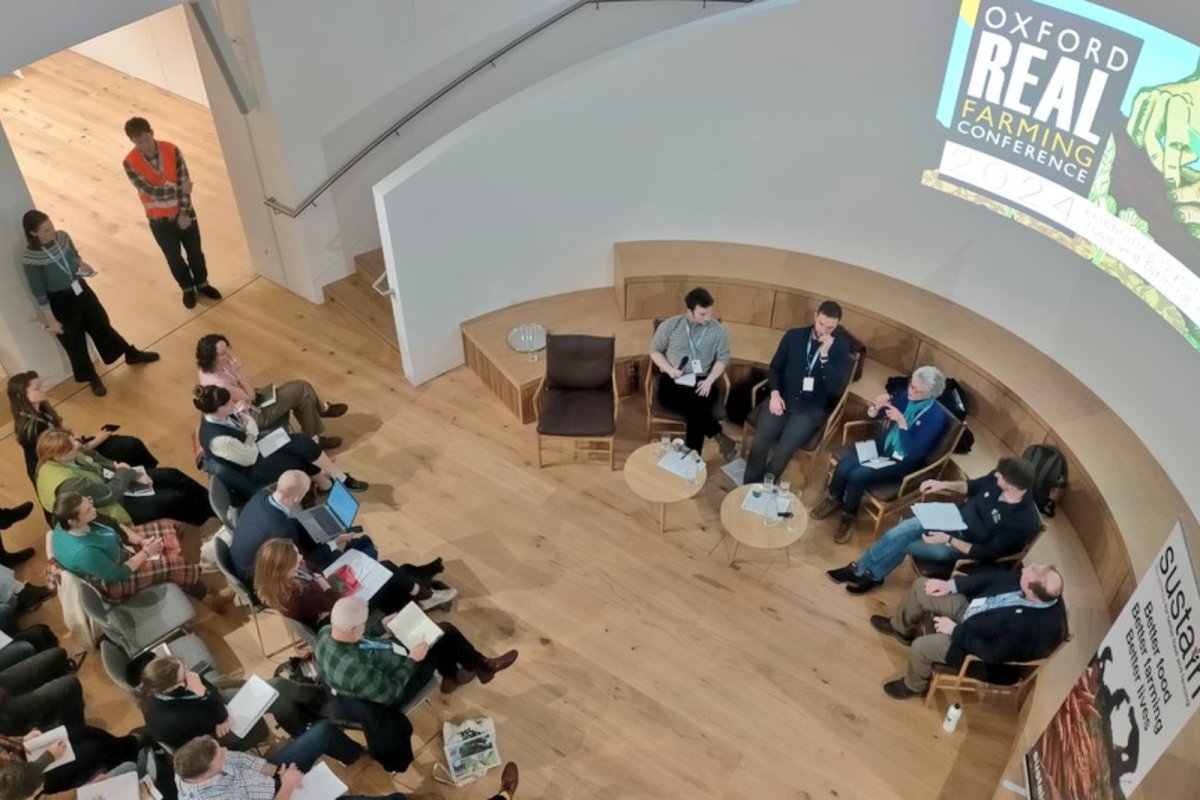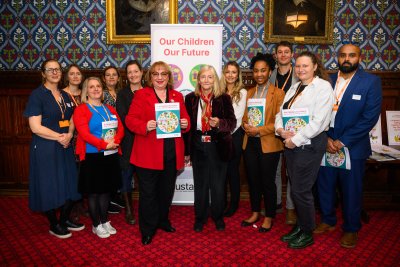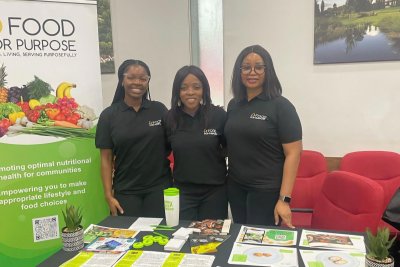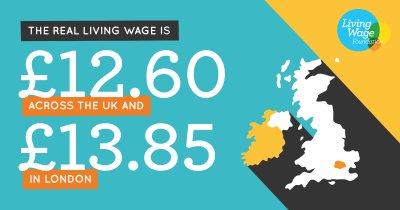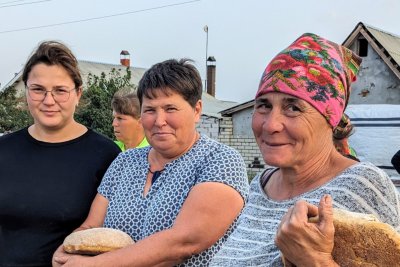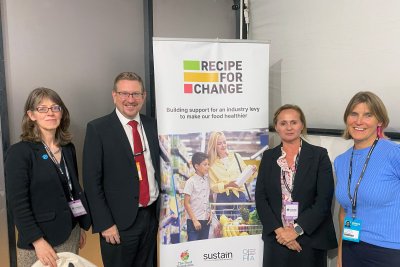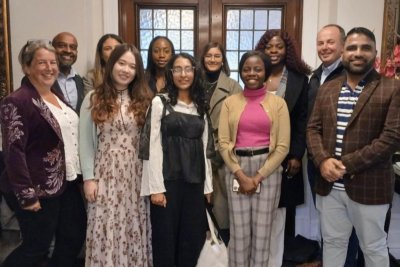 Sustain Policy Hub at ORFC. Credit: Vera Zakharov
Sustain Policy Hub at ORFC. Credit: Vera Zakharov
Reflecting on the Oxford Real Farming Conference (ORFC) 2024: Sustain's Key Takeaways
Auld Land Syne is still echoing by the time the Oxford farming conferences arrive with all their frenetic energy. With the initial whirlwind of activity behind us, we take a moment to reflect on the significant insights and developments that kicked off the year.
In celebration of Sustain's 25th anniversary, it was our privilege to host the 'policy hub' at the ORFC. Set in the striking Cheng Room of Jesus College, the venue became host to many fascinating discussions centred around food and farming policy. Those who missed the live experience can still access all of our policy room talks online here.
Influencing farm policy in every nation of the UK
I was incredibly pleased to host a session on 'shaping policy across the four nations' with Phil Carson, Martin Lines, Denise Walton and Rhys Evans - all key members of the nature friendly farming network across the UK.
The session was aimed to understand how each nation is handling their relative newfound autonomy with steering their own agricultural policies, nearly four years after the UK departure from the EU.
Funding emerged as a critical concern during the session, highlighted by Denise and Rhys, who voiced significant worries about the financial cutbacks in environmental schemes as the devolved governments look to make savings in their overall budgets.
Phil Carson underlined the relative value of farming by laying out the current £98 billion cost of obesity in the UK and the huge cost of flooding. When set against these daunting figures, the argument for increasing the £3.4 billion budget becomes quite compelling. They key message was that by investment in nature-friendly farming, we can harness its benefits and mitigate the exorbitant expenses resulting from an inefficient food and farming system.
Next door at the Oxford Farming Conference, Environment Secretary Steve Barclay announced 50 new measures to enhance the Environmental Land Management (ELM) schemes, with a focus on improving participation and introducing whole-system approaches like Agro-Forestry. These developments signal a commitment to sustainable practices and offer a beacon of hope for the future. Read more on the announcements here.
Cleaning Up Our Rivers
The grim reality of river pollution due to intensive farming was a focus of the 'Cleaning up our Rivers' session. This discussion shed light on how large agri-food businesses have exploited planning laws, leading to environmental harm through the unchecked proliferation of intensive livestock operations nationwide. Yet, amid these challenges, we witnessed encouraging signs of proactive farmer involvement and citizen-led science to counter this problem. These efforts underscored not only the pressing need to tackle these environmental crises but also showcased the practical steps we can take towards their resolution.
Realising the potential of public procurement for supporting local, agroecological farmers
The session shed light on the hidden potential and barriers in public procurement for delivering healthy, sustainable food. It showed that despite the potential for public procurement to deliver healthy and sustainable food to local communities, there's large structural barriers hindering progress. A poignant example from Leicestershire demonstrated the challenges of sourcing from local regenerative farms face despite their climate and biodiversity benefits, as the current allocation from government for free school meals means that the council owned meals service is in a constantly precarious position, unable to bring about the desired change towards more local sourcing.
On a more positive note, the case study from Wales showed the power of starting small, piloting a new approach, and growing it from there. A successful 2022 pilot started in Cardiff supplying courgettes from Blas Gwent Farmers to the Cardiff local authority during the summer holiday food and fun programme. The pilot program has expanded to five local authority areas.
Central to both case studies is the existence of food partnerships in the local areas, bringing farmers and caterers together, ironing out the barriers and raising political support.
Looking Ahead
Two central themes were common during the conference: supply chain reform and the importance of training and knowledge exchange. Addressing the supply chain requires better regulation of supermarkets and intermediaries to distribute risks more fairly and scaling up access to local, farmer-focussed routes to market.
Equally critical is the role of education and peer-to-peer learning in driving the shift towards agroecology. Farmers are at the forefront of this change, with policy makers, NGOs, and related organisations needing to facilitate knowledge sharing and community building among practitioners.
Despite the impressive attendance of 3,500 participants, the lack of national policy makers in policy discussions was a significant gap, highlighting the sometimes cavernous gap between policy discussion and policy making.
The determination at ORFC was palpable, and reflected a strong collective aspiration to transform our food and farming system for the best. As a once-radical newcomer, ORFC now sets the stage for inclusive and innovative discussions, surpassing other events in its popularity and reach.
As we look ahead, Sustain will continue to play an active role in promoting sustainable farming practices. We invite you to join us in this journey by supporting policy changes, engaging in local food partnerships, and contributing to our educational initiatives.
Do join our newsletter to engage and contribute to our ongoing work on farming and food.
Sustain: Sustain The alliance for better food and farming advocates food and agriculture policies and practices that enhance the health and welfare of people and animals, improve the working and living environment, enrich society and culture and promote equity.
Sustain
The Green House
244-254 Cambridge Heath Road
London E2 9DA
020 3559 6777
sustain@sustainweb.org
Sustain advocates food and agriculture policies and practices that enhance the health and welfare of people and animals, improve the working and living environment, promote equity and enrich society and culture.
© Sustain 2024
Registered charity (no. 1018643)
Data privacy & cookies
Icons by Icons8
